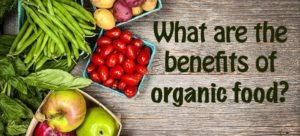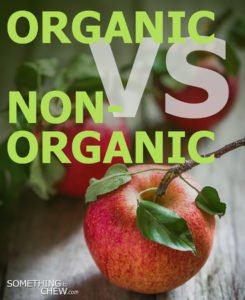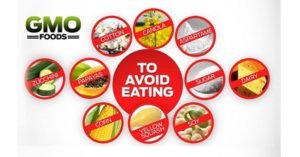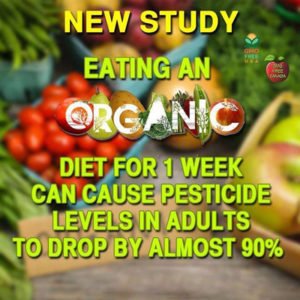Why Eat Organic Food? - Benefits Of Organic Food

Why Eat Organic Food? - Benefits Of Organic Food
Hello everyone we're going to talk about organic and organic foods. Should you be eating them? What's the effect of GMO and the different types of farming practices? I think organic is a really healthy way to live. Coming at you with why you should be eating organic foods, check it out. Alright so what this post is about is, should I be eating organic? What is organic food? What is real food? Should you be eating organic? What does organic mean?
Simply stated, organic produce and other foods are grown without the use of pesticides, synthetic fertilizer, sewage sludge, or genetically modified organisms. Plus no ionizing radiation. Animals that produce meat, poultry, eggs, and dairy products do not take antibiotics or growth hormones are considered organic. Now the USDA has defined organic as the following: organic food that is produced by farmers who emphasize the use of renewable resources and the conservation of soil and water to enhance environmental quality for future generations.
Organic meat, poultry, eggs, and dairy products come from animals that are given no antibiotics or growth hormones. Organic food is produced without using most conventional pesticides, fertilizers made with synthetic ingredients or sewage sludge. Before a product can be labeled organic, a government approved certifier inspects the farm where the food is grown. They make sure that the farmer is following all of the rules necessary to meet the USDA Organic Standards. Companies that handle or process organic foods before it gets to your local supermarket or restaurants must be certified too.
What About The Cost
So do organic foods cost more? The truth of the matter is that organic food doesn't always cost more. Some items such as coffee, cereal, bread and even hamburger may cost the same or even a little bit less than their conventional counterparts. And as demand for organic continues to grow, the costs will continue to come down. When the cost is higher, consider these facts: organic farmers don't receive federal subsidies like conventional farmers do, therefore, the price of organic food reflects the true cost of growing.
The price of conventional food does not reflect the cost of environment clean ups that we pay through our tax dollars. Plus organic farming is more labor in management intensive. Organic farms are usually smaller than conventional farms. So they do not benefit from the economies of scale that larger growers get. So organic foods, they may be more nutritional and my favorite way to describe organic foods is it's intuitive, that the least amount of chemicals and synthetics that you can have on your food, the healthier that your foods are.
Benefits of Eating Organic
Now one of the benefits of eating organic is that it helps you to avoid chemicals. Eating organically grown foods is the only way to avoid the cocktail of chemical poisons present in the commercially grown foods. More than 600 active chemicals are registered for agriculture in America. That takes us to the tune of billions of pounds annually. And the average application equates to about 16 pounds of chemical pesticides per person per year. Now a pesticide is a poison, it's designed to kill bugs, we're just bigger bugs. So intuitively, I feel that eating healthy and organic is going to help you. Some of the studies suggest that there's benefit for organic foods, some of the studies suggest there's no benefit but I believe it's a healthier lifestyle.
Now the National Academy of Sciences reports that 90% of many of the chemicals that were approved by the EPA before extensive dietary testing have not been tested for long-term health benefits before they were deemed safe. Further the FDA tests only about 1% of the foods for pesticide residues. And the most dangerous and toxic pesticides require special testing methods which are rarely if ever employed by the FDA.
So another of the benefits of eating organic is that there are more nutrients. Organically grown foods have more nutrients, vitamins, minerals, enzymes and the micro-nutrients. And it's interesting if you'll take organic food versus non-organic food, and perhaps it's in my mind, but it really seems like it tastes better. That is because it's grown in soil that is managed and nourished with sustainable practices by people with responsible standards.

Organic VS Non Organic
The Journal of Alternative Accomplished Medicine conducted a review of 41 published studies and compared the nutritional value of organically grown and conventionally grown fruits and vegetables. They concluded there are significantly more of several nutrients in organic foods and crops. Furthermore, the study verifies that five servings of organically grown vegetables such as lettuce, spinach, carrots, potatoes, and cabbage provide an adequate allowance of vitamin C. But, the same number of servings of conventionally grown vegetables do not.
On average, organically grown foods provide 21% more iron, 27% more vitamin C, 29.3% more magnesium, 13% more phosphorus and they seem to taste better. Now they don't always look as big. And they don't look as beautiful but the organic foods generally taste better. Because they are nourished, well-balanced, the soil products are healthy and they are strong plants. This is especially true with heirloom varieties which are cultivated for taste over appearance.
GMO - Genetically Modified Organisms

Now eating organic helps us to avoid GMO foods or genetically engineered and genetically modified organisms are contaminating our food supply at an alarming rate. Now this is my personal opinion. I've had some very educated people say GMO foods are not nearly the culprit that everybody says they are. But it would be better to eat organically because organically grown food cannot be genetically modified in any way. Choosing organic foods is the only way to be sure that the foods that have been genetically engineered stay out of your diet.
So here's what you need to know about GMO foods. One, avoid hormones, antibiotics and drugs and animal products because those antibiotics and drugs go through the food supply and they can get into you. This will throw you into hormone imbalance and make you more susceptible for chronic infection. Conventional meat and dairy are highest risk foods for contamination by these harmful substances! More than 90% of the pesticides that Americans consume are found in the fat and tissues of meat and dairy products.
Pesticide Intake

Now the EPA reports that the majority of pesticide intake comes from meat and dairy products because all of these are high up in the food chain. For instance, a large fish that eats a smaller fish that eats even a smaller fish accumulates all of the toxins in that chain especially in the fatty tissues. Cows, chickens, and pigs are fed animal parts and byproducts, fish meal and grains that are heavily and collectively laden with toxins and chemicals. Now lower fat animal products are less dangerous as the toxic chemicals are accumulated and concentrated in fatty tissues, so lean meats are healthier.
Antibiotics, Drugs and Growth Hormones
Antibiotics, drugs and growth hormones are directly passed into the meat and dairy products. And tens of millions of pounds of antibiotics are used in animal feed every year. The Union of Concerned Scientists estimates roughly 70% of antibiotics produced in the United States are fed to animals for non therapeutic purposes. Farmers have been giving sex hormones and growth hormones to cattle to artificially increase the amount of meat and milk the cattle produce without requiring extra feed.
The hormones fed to the cows cannot be broken down even at higher temperatures. Therefore, they remain in complete form and pass directly to us, the consumer, in the diet when the meat is eaten. So hormone supplementation is a big concern with beef and dairy products and farmed fish. In the United States the jury's still out. But in Europe the scientific community agrees that there's no acceptable safe level for the daily intake. And many of the hormones currently used in the United States and subsequently banned in all growth hormones.
Major Concerns
The majority concerns for US consumers include the early onset of puberty, growth of tumors, heightened cancer risks, and genetic problems. And growth hormones are genetically modified and had been directly linked to cancer especially in women. So many scientists and experts warn that the rampant use of antibiotics and growth hormones in animal feed plus things like penicillin and tetracycline are going to breed an epidemic of medicine that there's really no defense against in the conventional medical world.
Now Dr. Almond, a senior scientist at the National Defense Resources states that perhaps one of the most serious public health problems the country faces is the over-utilization of antibiotics, growth hormone, and animal parts in our food supply. We're talking about rendering many of the most important antibiotics against disease ineffective. We need to be choosing organic animal products especially for children, pregnant women, and nursing mothers. We need to limit that as best as possible.
Ecosystems
Choosing organic helps preserve our ecosystems because organic farming supports the ecosystems in a farming harmony with nature. The preservation of soil crops and rotations is extremely important and the chemical abstinence preserves the ecosystem. It helps with wildlife, insects, birds, and soil organisms that normally can't function with conventional farming practices. Now eating organic helps to reduce pollution and protects water contaminating our environment. And poisoning our precious water supplies and destroying the value of the fertile farmland. Certified organic standards do not permit the use of toxic chemicals in farming. And the require responsibility for management of healthy soil and biodiversity.
According to Cornell entomologist, David Peniel, it is estimated that 0.1% of the applied pesticides reached the target pass. The bulk of them were left to impact the environment. And if we preserve the agricultural diversity, the rampant loss of species occurring is a huge environmental concern. It is estimated that 75% of the genetic diversity of agricultural crops have been lost in the last century. Leaning heavily on one of the varieties of a given food is a formulation for devastation. Every year, American tax dollars subsidize billions of dollars for a farm bill that heavily favors commercial agribusiness. And peeling back another layer of the modern farming union reveals that the price tag cannot be accurately measured. Plus it certainly includes other detrimental associated costs as health problems. Also environmental damage and the loss and extinction of wildlife in ecology.
Conclusion
You can keep your children's and your future health by putting money into organic. Our mouths are in a more powerful position to take back the one trillion dollar food industry market in America. Spending dollars in the organic sector is a direct vote for the sustainable future for many generations to come. Now I think eating organic is healthy, is sustainable and it's good for the ecology. It really helps to prevent autoimmune and chronic diseases. The healthier and alive your food is, the more natural your food is, the healthier your life and the more natural you'll be.
I hope you enjoyed this benefits of organic foods post. If you liked this post please give me thumbs up, leave me a comment or a vote. Thanks a million for reading my post and I'll catch you wonderful people later!!
Post from BestOrganicFoodNearMe.com